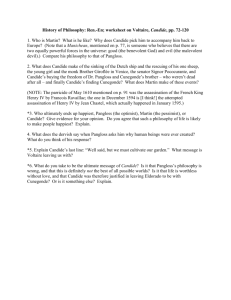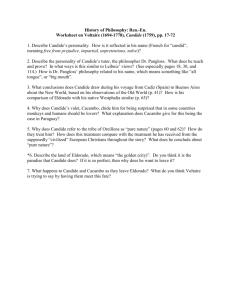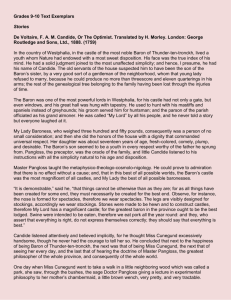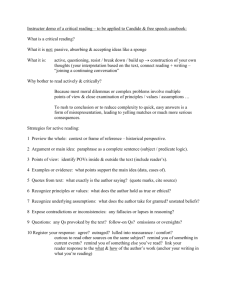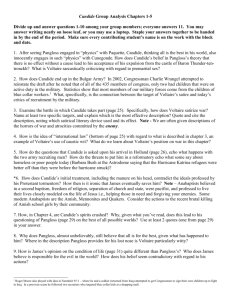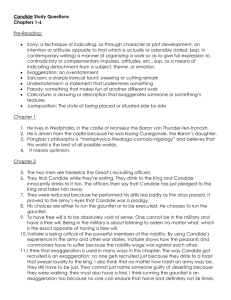CANDIDE by VOLTAIRE
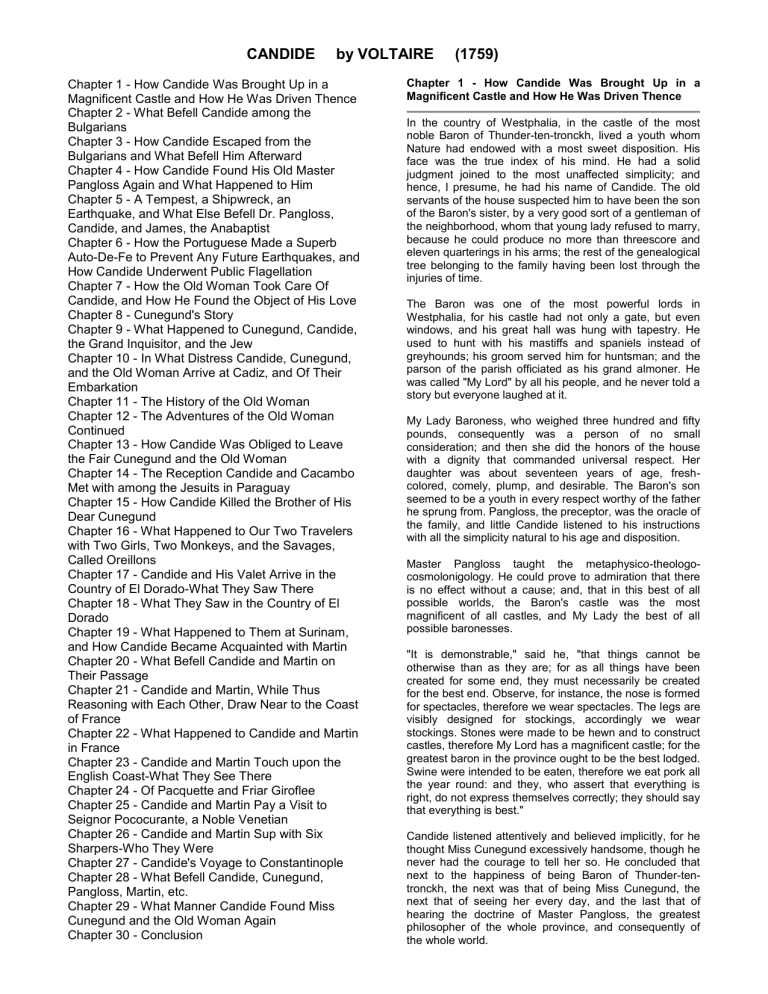
CANDIDE by VOLTAIRE (1759)
Chapter 1 - How Candide Was Brought Up in a
Magnificent Castle and How He Was Driven Thence
Chapter 1 - How Candide Was Brought Up in a
Magnificent Castle and How He Was Driven Thence
Chapter 2 - What Befell Candide among the
Bulgarians
Chapter 3 - How Candide Escaped from the
Bulgarians and What Befell Him Afterward
Chapter 4 - How Candide Found His Old Master
Pangloss Again and What Happened to Him
Chapter 5 - A Tempest, a Shipwreck, an
Earthquake, and What Else Befell Dr. Pangloss,
Candide, and James, the Anabaptist
Chapter 6 - How the Portuguese Made a Superb
Auto-De-Fe to Prevent Any Future Earthquakes, and
How Candide Underwent Public Flagellation
Chapter 7 - How the Old Woman Took Care Of
Candide, and How He Found the Object of His Love
Chapter 8 - Cunegund's Story
Chapter 9 - What Happened to Cunegund, Candide, the Grand Inquisitor, and the Jew
Chapter 10 - In What Distress Candide, Cunegund, and the Old Woman Arrive at Cadiz, and Of Their
Embarkation
Chapter 11 - The History of the Old Woman
Chapter 12 - The Adventures of the Old Woman
Continued
Chapter 13 - How Candide Was Obliged to Leave the Fair Cunegund and the Old Woman
Chapter 14 - The Reception Candide and Cacambo
Met with among the Jesuits in Paraguay
Chapter 15 - How Candide Killed the Brother of His
Dear Cunegund
Chapter 16 - What Happened to Our Two Travelers with Two Girls, Two Monkeys, and the Savages,
Called Oreillons
Chapter 17 - Candide and His Valet Arrive in the
Country of El Dorado-What They Saw There
Chapter 18 - What They Saw in the Country of El
Dorado
Chapter 19 - What Happened to Them at Surinam, and How Candide Became Acquainted with Martin
Chapter 20 - What Befell Candide and Martin on
Their Passage
Chapter 21 - Candide and Martin, While Thus
Reasoning with Each Other, Draw Near to the Coast of France
Chapter 22 - What Happened to Candide and Martin in France
Chapter 23 - Candide and Martin Touch upon the
English Coast-What They See There
Chapter 24 - Of Pacquette and Friar Giroflee
Chapter 25 - Candide and Martin Pay a Visit to
Seignor Pococurante, a Noble Venetian
Chapter 26 - Candide and Martin Sup with Six
Sharpers-Who They Were
Chapter 27 - Candide's Voyage to Constantinople
Chapter 28 - What Befell Candide, Cunegund,
Pangloss, Martin, etc.
Chapter 29 - What Manner Candide Found Miss
Cunegund and the Old Woman Again
Chapter 30 - Conclusion
In the country of Westphalia, in the castle of the most noble Baron of Thunder-ten-tronckh, lived a youth whom
Nature had endowed with a most sweet disposition. His face was the true index of his mind. He had a solid judgment joined to the most unaffected simplicity; and hence, I presume, he had his name of Candide. The old servants of the house suspected him to have been the son of the Baron's sister, by a very good sort of a gentleman of the neighborhood, whom that young lady refused to marry, because he could produce no more than threescore and eleven quarterings in his arms; the rest of the genealogical tree belonging to the family having been lost through the injuries of time.
The Baron was one of the most powerful lords in
Westphalia, for his castle had not only a gate, but even windows, and his great hall was hung with tapestry. He used to hunt with his mastiffs and spaniels instead of greyhounds; his groom served him for huntsman; and the parson of the parish officiated as his grand almoner. He was called "My Lord" by all his people, and he never told a story but everyone laughed at it.
My Lady Baroness, who weighed three hundred and fifty pounds, consequently was a person of no small consideration; and then she did the honors of the house with a dignity that commanded universal respect. Her daughter was about seventeen years of age, freshcolored, comely, plump, and desirable. The Baron's son seemed to be a youth in every respect worthy of the father he sprung from. Pangloss, the preceptor, was the oracle of the family, and little Candide listened to his instructions with all the simplicity natural to his age and disposition.
Master Pangloss taught the metaphysico-theologocosmolonigology. He could prove to admiration that there is no effect without a cause; and, that in this best of all possible worlds, the Baron's castle was the most magnificent of all castles, and My Lady the best of all possible baronesses.
"It is demonstrable," said he, "that things cannot be otherwise than as they are; for as all things have been created for some end, they must necessarily be created for the best end. Observe, for instance, the nose is formed for spectacles, therefore we wear spectacles. The legs are visibly designed for stockings, accordingly we wear stockings. Stones were made to be hewn and to construct castles, therefore My Lord has a magnificent castle; for the greatest baron in the province ought to be the best lodged.
Swine were intended to be eaten, therefore we eat pork all the year round: and they, who assert that everything is right, do not express themselves correctly; they should say that everything is best."
Candide listened attentively and believed implicitly, for he thought Miss Cunegund excessively handsome, though he never had the courage to tell her so. He concluded that next to the happiness of being Baron of Thunder-tentronckh, the next was that of being Miss Cunegund, the next that of seeing her every day, and the last that of hearing the doctrine of Master Pangloss, the greatest philosopher of the whole province, and consequently of the whole world.
One day when Miss Cunegund went to take a walk in a little neighboring wood which was called a park, she saw, through the bushes, the sage Doctor Pangloss giving a lecture in experimental philosophy to her mother's chambermaid, a little brown wench, very pretty, and very tractable. As Miss Cunegund had a great disposition for the sciences, she observed with the utmost attention the experiments which were repeated before her eyes; she perfectly well understood the force of the doctor's reasoning upon causes and effects. She retired greatly flurried, quite pensive and filled with the desire of knowledge, imagining that she might be a sufficing reason for young Candide, and he for her.
On her way back she happened to meet the young man; she blushed, he blushed also; she wished him a good morning in a flattering tone, he returned the salute, without knowing what he said. The next day, as they were rising from dinner, Cunegund and Candide slipped behind the screen. The miss dropped her handkerchief, the young man picked it up. She innocently took hold of his hand, and he as innocently kissed hers with a warmth, a sensibility, a grace-all very particular; their lips met; their eyes sparkled; their knees trembled; their hands strayed.
The Baron chanced to come by; he beheld the cause and effect, and, without hesitation, saluted Candide with some notable kicks on the breech and drove him out of doors.
The lovely Miss Cunegund fainted away, and, as soon as she came to herself, the Baroness boxed her ears. Thus a general consternation was spread over this most magnificent and most agreeable of all possible castles.
Chapter 4 - How Candide Found His Old Master
Pangloss Again and What Happened to Him
The next day, as Candide was walking out, he met a beggar all covered with scabs, his eyes sunk in his head, the end of his nose eaten off, his mouth drawn on one side, his teeth as black as a cloak, snuffling and coughing most violently, and every time he attempted to spit out dropped a tooth.
Candide, divided between compassion and horror, but giving way to the former, bestowed on this shocking figure the two florins which the honest Anabaptist, James, had just before given to him. The specter looked at him very earnestly, shed tears and threw his arms about his neck.
Candide started back aghast.
"Alas!" said the one wretch to the other, "don't you know dear Pangloss?"
"What do I hear? Is it you, my dear master! you I behold in this piteous plight? What dreadful misfortune has befallen you? What has made you leave the most magnificent and delightful of all castles? What has become of Miss
Cunegund, the mirror of young ladies, and Nature's masterpiece?"
"Oh, Lord!" cried Pangloss, "I am so weak I cannot stand," upon which Candide instantly led him to the Anabaptist's stable, and procured him something to eat.
As soon as Pangloss had a little refreshed himself,
Candide began to repeat his inquiries concerning Miss
Cunegund.
"She is dead," replied the other.
"Dead!" cried Candide, and immediately fainted away; his friend restored him by the help of a little bad vinegar, which he found by chance in the stable.
Candide opened his eyes, and again repeated: "Dead! is
Miss Cunegund dead? Ah, where is the best of worlds now? But of what illness did she die? Was it of grief on seeing her father kick me out of his magnificent castle?"
"No," replied Pangloss, "her body was ripped open by the
Bulgarian soldiers, after they had subjected her to as much cruelty as a damsel could survive; they knocked the
Baron, her father, on the head for attempting to defend her; My Lady, her mother, was cut in pieces; my poor pupil was served just in the same manner as his sister; and as for the castle, they have not left one stone upon another; they have destroyed all the ducks, and sheep, the barns, and the trees; but we have had our revenge, for the
Abares have done the very same thing in a neighboring barony, which belonged to a Bulgarian lord."
At hearing this, Candide fainted away a second time, but, not withstanding, having come to himself again, he said all that it became him to say; he inquired into the cause and effect, as well as into the sufficing reason that had reduced Pangloss to so miserable a condition.
"Alas," replied the preceptor, "it was love; love, the comfort of the human species; love, the preserver of the universe; the soul of all sensible beings; love! tender love!"
"Alas," cried Candide, "I have had some knowledge of love myself, this sovereign of hearts, this soul of souls; yet it never cost me more than a kiss and twenty kicks on the backside. But how could this beautiful cause produce in you so hideous an effect?"
Pangloss made answer in these terms:
"O my dear Candide, you must remember Pacquette, that pretty wench, who waited on our noble Baroness; in her arms I tasted the pleasures of Paradise, which produced these Hell torments with which you see me devoured. She was infected with an ailment, and perhaps has since died of it; she received this present of a learned Franciscan, who derived it from the fountainhead; he was indebted for it to an old countess, who had it of a captain of horse, who had it of a marchioness, who had it of a page, the page had it of a Jesuit, who, during his novitiate, had it in a direct line from one of the fellow adventurers of
Christopher Columbus; for my part I shall give it to nobody, I am a dying man."
"O sage Pangloss," cried Candide, "what a strange genealogy is this! Is not the devil the root of it?"
"Not at all," replied the great man, "it was a thing unavoidable, a necessary ingredient in the best of worlds; for if Columbus had not caught in an island in America this disease, which contaminates the source of generation, and frequently impedes propagation itself, and is evidently opposed to the great end of nature, we should have had neither chocolate nor cochineal. It is also to be observed, that, even to the present time, in this continent of ours, this malady, like our religious controversies, is peculiar to ourselves. The Turks, the Indians, the Persians, the
Chinese, the Siamese, and the Japanese are entirely unacquainted with it; but there is a sufficing reason for them to know it in a few centuries. In the meantime, it is
making prodigious havoc among us, especially in those armies composed of well disciplined hirelings, who determine the fate of nations; for we may safely affirm, that, when an army of thirty thousand men engages another equal in size, there are about twenty thousand infected with syphilis on each side."
"Very surprising, indeed," said Candide, "but you must get cured."
"Lord help me, how can I?" said Pangloss. "My dear friend, I have not a penny in the world; and you know one cannot be bled or have an enema without money."
This last speech had its effect on Candide; he flew to the charitable Anabaptist, James; he flung himself at his feet, and gave him so striking a picture of the miserable condition of his friend that the good man without any further hesitation agreed to take Dr. Pangloss into his house, and to pay for his cure. The cure was effected with only the loss of one eye and an ear. As be wrote a good hand, and understood accounts tolerably well, the
Anabaptist made him his bookkeeper. At the expiration of two months, being obliged by some mercantile affairs to go to Lisbon he took the two philosophers with him in the same ship; Pangloss, during the course of the voyage, explained to him how everything was so constituted that it could not be better. James did not quite agree with him on this point.
"Men," said he "must, in some things, have deviated from their original innocence; for they were not born wolves, and yet they worry one another like those beasts of prey.
God never gave them twenty-four pounders nor bayonets, and yet they have made cannon and bayonets to destroy one another. To this account I might add not only bankruptcies, but the law which seizes on the effects of bankrupts, only to cheat the creditors."
"All this was indispensably necessary," replied the oneeyed doctor, "for private misfortunes are public benefits; so that the more private misfortunes there are, the greater is the general good."
While he was arguing in this manner, the sky was overcast, the winds blew from the four quarters of the compass, and the ship was assailed by a most terrible tempest, within sight of the port of Lisbon.
Chapter 30 - Conclusion
Candide had, in truth, no great inclination to marry Miss
Cunegund; but the extreme impertinence of the Baron determined him to conclude the match; and Cunegund pressed him so warmly, that he could not recant. He consulted Pangloss, Martin, and the faithful Cacambo.
Pangloss composed a fine memorial, by which he proved that the Baron had no right over his sister; and that she might, according to all the laws of the Empire, marry
Candide with the left hand. Martin concluded to throw the
Baron into the sea; Cacambo decided that he must be delivered to the Turkish captain and sent to the galleys; after which he should be conveyed by the first ship to the
Father General at Rome. This advice was found to be good; the old woman approved of it, and not a syllable was said to his sister; the business was executed for a little money; and they had the pleasure of tricking a Jesuit, and punishing the pride of a German baron.
It was altogether natural to imagine, that after undergoing so many disasters, Candide, married to his mistress and living with the philosopher Pangloss, the philosopher
Martin, the prudent Cacambo, and the old woman, having besides brought home so many diamonds from the country of the ancient Incas, would lead the most agreeable life in the world. But he had been so robbed by the Jews, that he had nothing left but his little farm; his wife, every day growing more and more ugly, became headstrong and insupportable; the old woman was infirm, and more ill-natured yet than Cunegund. Cacambo, who worked in the garden, and carried the produce of it to sell in Constantinople, was above his labor, and cursed his fate. Pangloss despaired of making a figure in any of the
German universities. And as to Martin, he was firmly persuaded that a person is equally ill-situated everywhere.
He took things with patience.
Candide, Martin, and Pangloss disputed sometimes about metaphysics and morality. Boats were often seen passing under the windows of the farm laden with effendis, bashaws, and cadis, that were going into banishment to
Lemnos, Mytilene and Erzerum. And other cadis, bashaws, and effendis were seen coming back to succeed the place of the exiles, and were driven out in their turns.
They saw several heads curiously stuck upon poles, and carried as presents to the Sublime Porte. Such sights gave occasion to frequent dissertations; and when no disputes were in progress, the irksomeness was so excessive that the old woman ventured one day to tell them:
"I would be glad to know which is worst, to be ravished a hundred times by Negro pirates, to have one buttock cut off, to run the gauntlet among the Bulgarians, to be whipped and hanged at an auto-da-fe, to be dissected, to be chained to an oar in a galley; and, in short, to experience all the miseries through which every one of us hath passed, or to remain here doing nothing?"
"This," said Candide, "is a grand question."
This discourse gave birth to new reflections, and Martin especially concluded that man was born to live in the convulsions of disquiet, or in the lethargy of idleness.
Though Candide did not absolutely agree to this, yet he did not determine anything on that head. Pangloss avowed that he had undergone dreadful sufferings; but having once maintained that everything went on as well as possible, he still maintained it, and at the same time believed nothing of it.
There was one thing which more than ever confirmed
Martin in his detestable principles, made Candide hesitate, and embarrassed Pangloss, which was the arrival of
Pacquette and Brother Giroflee one day at their farm. This couple had been in the utmost distress; they had very speedily made away with their three thousand piastres; they had parted, been reconciled; quarreled again, been thrown into prison; had made their escape, and at last
Brother Giroflee had turned Turk. Pacquette still continued to follow her trade; but she got little or nothing by it.
"I foresaw very well," said Martin to Candide "that your presents would soon be squandered, and only make them more miserable. You and Cacambo have spent millions of piastres, and yet you are not more happy than Brother
Giroflee and Pacquette."
"Ah!" said Pangloss to Pacquette, "it is Heaven that has brought you here among us, my poor child! Do you know that you have cost me the tip of my nose, one eye, and one ear? What a handsome shape is here! and what is this world!"
This new adventure engaged them more deeply than ever in philosophical disputations.
In the neighborhood lived a famous dervish who passed for the best philosopher in Turkey; they went to consult him: Pangloss, who was their spokesman, addressed him thus:
"Master, we come to entreat you to tell us why so strange an animal as man has been formed?"
"Why do you trouble your head about it?" said the dervish;
"is it any business of yours?"
"But, Reverend Father," said Candide, "there is a horrible deal of evil on the earth."
"What signifies it," said the dervish, "whether there is evil or good? When His Highness sends a ship to Egypt does he trouble his head whether the rats in the vessel are at their ease or not?"
"What must then be done?" said Pangloss.
"Be silent," answered the dervish.
"I flattered myself," replied Pangloss, "to have reasoned a little with you on the causes and effects, on the best of possible worlds, the origin of evil, the nature of the soul, and a pre-established harmony."
At these words the dervish shut the door in their faces.
During this conversation, news was spread abroad that two viziers of the bench and the mufti had just been strangled at Constantinople, and several of their friends impaled. This catastrophe made a great noise for some hours. Pangloss, Candide, and Martin, as they were returning to the little farm, met with a good-looking old man, who was taking the air at his door, under an alcove formed of the boughs of orange trees. Pangloss, who was as inquisitive as he was disputative, asked him what was the name of the mufti who was lately strangled.
"I cannot tell," answered the good old man; "I never knew the name of any mufti, or vizier breathing. I am entirely ignorant of the event you speak of; I presume that in general such as are concerned in public affairs sometimes come to a miserable end; and that they deserve it: but I never inquire what is doing at Constantinople; I am contented with sending thither the produce of my garden, which I cultivate with my own hands."
After saying these words, he invited the strangers to come into his house. His two daughters and two sons presented them with divers sorts of sherbet of their own making; besides caymac, heightened with the peels of candied citrons, oranges, lemons, pineapples, pistachio nuts, and
Mocha coffee unadulterated with the bad coffee of Batavia or the American islands. After which the two daughters of this good Mussulman perfumed the beards of Candide,
Pangloss, and Martin.
"You must certainly have a vast estate," said Candide to the Turk.
"I have no more than twenty acres of ground," he replied,
"the whole of which I cultivate myself with the help of my children; and our labor keeps off from us three great evilsidleness, vice, and want."
Candide, as he was returning home, made profound reflections on the Turk's discourse.
"This good old man," said he to Pangloss and Martin,
"appears to me to have chosen for himself a lot much preferable to that of the six Kings with whom we had the honor to sup."
"Human grandeur," said Pangloss, "is very dangerous, if we believe the testimonies of almost all philosophers; for we find Eglon, King of Moab, was assassinated by Aod;
Absalom was hanged by the hair of his head, and run through with three darts; King Nadab, son of Jeroboam, was slain by Baaza; King Ela by Zimri; Okosias by Jehu;
Athaliah by Jehoiada; the Kings Jehooiakim, Jeconiah, and Zedekiah, were led into captivity: I need not tell you what was the fate of Croesus, Astyages, Darius, Dionysius of Syracuse, Pyrrhus, Perseus, Hannibal, Jugurtha,
Ariovistus, Caesar, Pompey, Nero, Otho, Vitellius,
Domitian, Richard II of England, Edward II, Henry VI,
Richard Ill, Mary Stuart, Charles I, the three Henrys of
France, and the Emperor Henry IV."
"Neither need you tell me," said Candide, "that we must take care of our garden."
"You are in the right," said Pangloss; "for when man was put into the garden of Eden, it was with an intent to dress it; and this proves that man was not born to be idle."
"Work then without disputing," said Martin; "it is the only way to render life supportable."
The little society, one and all, entered into this laudable design and set themselves to exert their different talents.
The little piece of ground yielded them a plentiful crop.
Cunegund indeed was very ugly, but she became an excellent hand at pastrywork: Pacquette embroidered; the old woman had the care of the linen. There was none, down to Brother Giroflee, but did some service; he was a very good carpenter, and became an honest man.
Pangloss used now and then to say to Candide:
"There is a concatenation of all events in the best of possible worlds; for, in short, had you not been kicked out of a fine castle for the love of Miss Cunegund; had you not been put into the Inquisition; had you not traveled over
America on foot; had you not run the Baron through the body; and had you not lost all your sheep, which you brought from the good country of El Dorado, you would not have been here to eat preserved citrons and pistachio nuts."
"Excellently observed," answered Candide; "but let us cultivate our garden."

